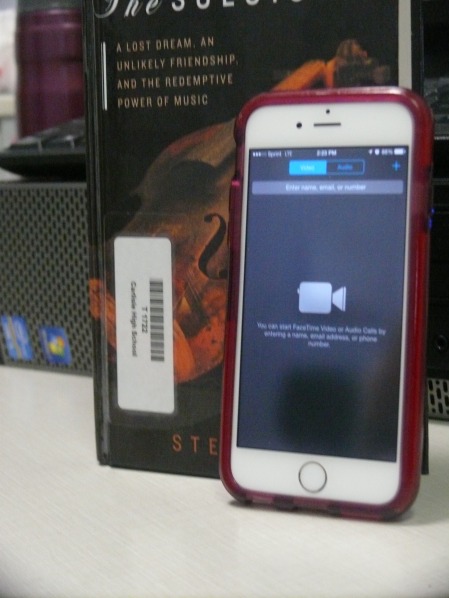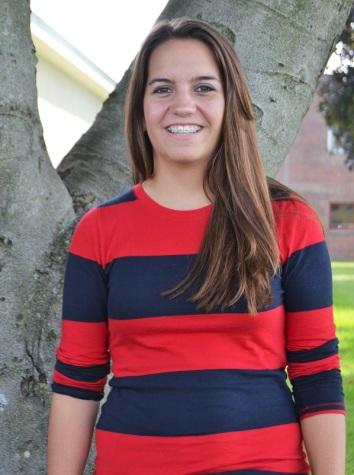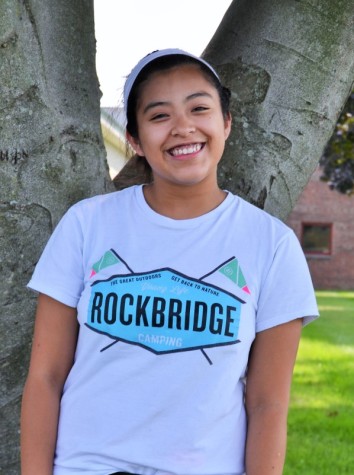Putting a ‘Face’ to a name: Students use FaceTime to meet author

10th grade English students FaceTime with the author of The Soloist
Ernest Hemmingway. John Knowles. Raymond Carver. What do these authors have in common?
Unfortunately, they’re all dead.
While sad, you may be asking: Why is this relevant? Well this means that most students don’t have the opportunity to interact with the authors of the books they’re reading. With this in mind, sophomore English teacher Jason Griffith introduced LA Times journalist Steve Lopez’s book The Soloist to the Honors English curriculum.
The Soloist is about the true story of Nathanial Anthony Ayers, a former Julliard student diagnosed with schizophrenia, told from Lopez’s perspective as Ayers’s friend.
“Having the experience to interact with the author of one of our class books was something that my students really enjoyed. Mr. Lopez was generous to make time in his busy schedule to spend with us, and we got to hear some great stories that weren’t in the book,” said Griffith.
On Monday, Mar 16, Griffith’s three Honors English classes met in his classroom during period 7 to FaceTime with Lopez and ask him questions about his book.
After roughly a month of reading and watching different pieces about Ayers, about 60 students filed into Griffith’s classroom to spread out across the floor, chairs, and desks. FaceTime started ringing and silence fell over the room as the students waited for Lopez to pick up.
Griffith started the call with an introduction and a few ice breaker questions. Lopez talked honestly about the never-ending road to recovery he was watching Ayers travel, and shared his disappointment and frustration that ten years have gone by since their friendship began, yet the situation on Skid Row hasn’t changed. The class listened to his stories intently, laughing often and captured by hearing the story in real time.
Sophomore Ally Lanceta said, “My favorite part was getting to hear how his relationship with [Ayers] has grown and improved after the book and it helped me to feel more connected to the story on a personal level, and develop a better understanding of the homeless community.”
Other students enjoyed simply getting a look into the life of Lopez and Ayers without the covering of an edited book or movie.
Sophomore Kate Erfle said, “My favorite part was being able to talk to the ‘real’ Lopez and actually [get] his opinion about [Ayers], the book/movie, and the whole situation without it being changed by publishers, editors, directors, et cetera.”
The FaceTime with Lopez reinforced many lessons from the book, while introducing just as many new ones.
Griffith said, “The conversation helped students recognize that the name on the cover is also a living, breathing person who made intentional decisions about his process and product. More than that, Mr. Lopez encouraged students to help with one of his main purposes for writing: ending the stigmas on mental illness and homelessness.”
Lopez himself charged the students with a responsibility, saying, “You all are now part of the solution by continuing to help destigmatize mental illness and homelessness.”
For more information about mental illnesses and what you can do to make a difference, visit The National Alliance on Mental Illness.
Want to help the Herd? Please consider supporting the Periscope program. Your donation will support the student journalists of CHS and allow us to purchase equipment, send students to workshops/camps, and cover our annual website hosting costs.

Sarah Payne is in 10th grade. She works in Periscope as a Perspectives Writer. She reads, writes, and watches movies. Her favorite book is the Hobbit,...

This is Clara Cozort's third year on staff for Periscope! Clara has taken on the roll of being Art Director and Co-Director of social media. While she...




























































































Michaela McQuaig • Mar 26, 2015 at 5:49 pm
I think this is awesome! Not only did Sarah write a great article, the concept is so cool. While it is good to study classics in English classes, there is so much value in getting to talk to the author on such a personal level. So many times in class, we find ourselves asking and trying to study why an author characterized a certain way, or why they made certain plot choices. Many of the authors that we are questioning have been dead for 100 years or more in some cases, so the experience and ability to have that conversation with the living author is so cool! I think this should be integrated even more into the English curriculum!
Kenleigh Peet • Mar 26, 2015 at 12:16 pm
This is so cool! I’ve always loved going to book signings and meetings where authors read their own works. This often gives readers a better, or just different understanding of a writing. I imagine that students involved were able to much better see and seek meaning in this novel after speaking with the author.
Sofie Praestgaard • Mar 25, 2015 at 5:12 pm
I honestly would love to have this kind of experience. Listening to authors talk about their books is so interesting to me. Like Mr. Griffith said, getting an inside look into the writing process is so inspiring. I had never really considered reading the soloist, but now it’s definitely on my list, especially since my brother talked to me about how amazing the interview was. The author seems to have a lifetime of knowledge and insight into humanity.
Jason Griffith • Mar 25, 2015 at 9:27 am
Thanks to Ms. Payne and the CHS Periscope for this article! This experience was special thanks to both Mr. Lopez’s generosity and the help of the CHS tech department, who made sure all of the technological pieces were in place in order for my students and me to see, hear, and talk with the author during the FaceTime conversation. The most interesting statistic Mr. Lopez shared is that 90,000 people are homeless and on the streets in Los Angeles. To put this in perspective, he asked what the population of Carlisle was, and a student Googled the answer: about 17,000. That means that more than five times the population of Carlisle are currently homeless in LA! Both the book The Soloist and the chat with the author helped to put a human face on the enduring societal problems of mental illness and homelessness.
Ryan Doody • Mar 24, 2015 at 7:57 am
Mr. Griffith is such an innovative teacher. I gotta give him credit for going above and beyond and really setting his students up for the best possible understanding of The Soloist. I know it would be awesome to meet an author and find out what he or she was thinking, that way we don’t have to guess!
Julia Vichnevetsky • Mar 23, 2015 at 11:07 am
I think that knowing about an author can establish a much greater appreciation for their works. For my literature criticism essay, I had to do research on Ernest Hemingway’s life, and how his life influenced his books. Knowing his life story (at least part of it) helped me to better understand his stories. I’m sure that meeting him and asking him questions would have been an even greater experience, so I think it’s such a good opportunity that these students were able to meet Mr. Lopez.